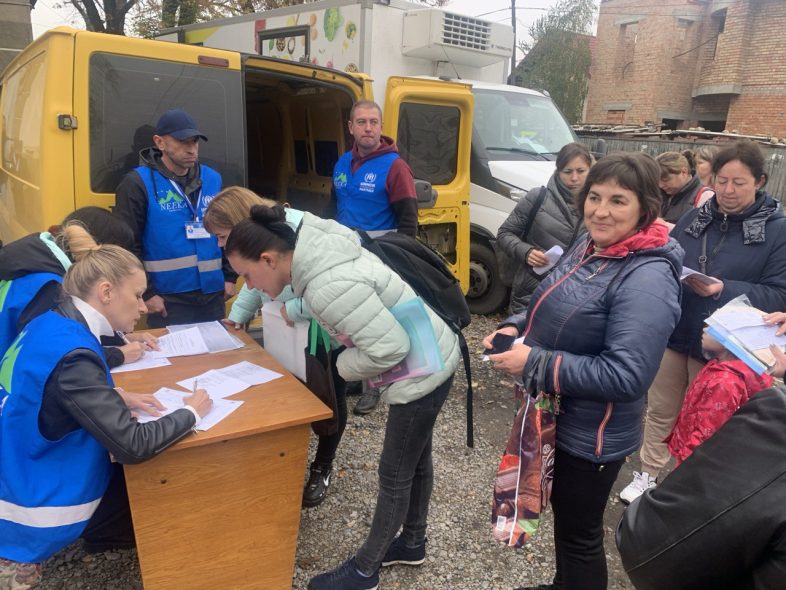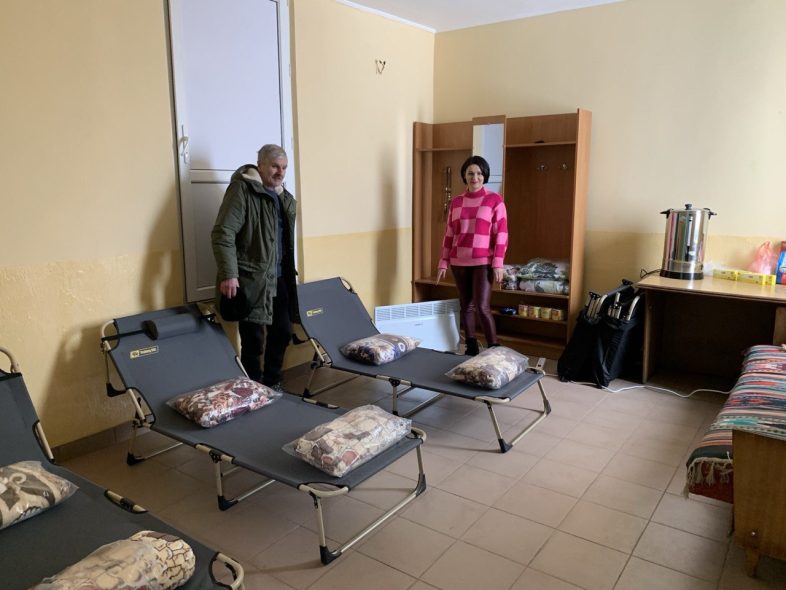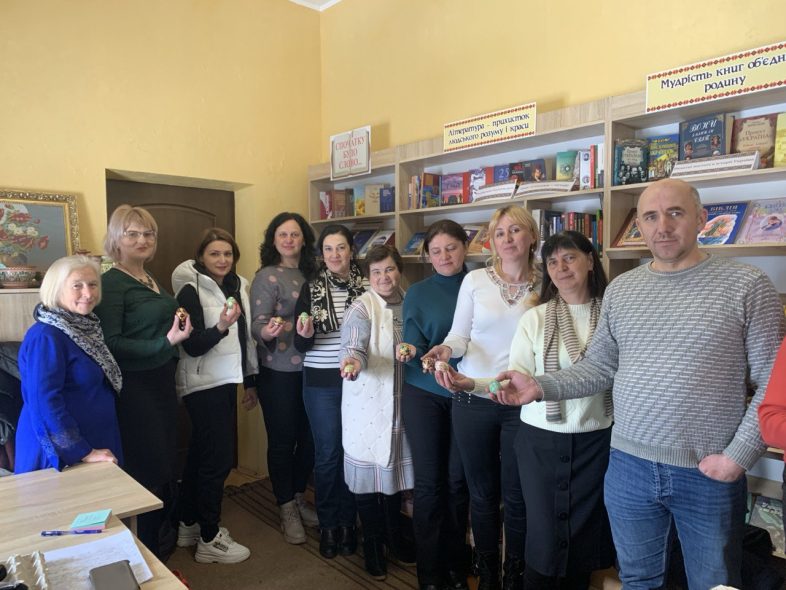Liudmyla Sirko, a lawyer from Enerhodar, head of the NGO ‘Family Circle / Public Expertise,’ and deputy chief of the Blahovischenska military village administration, provides free legal assistance to internally displaced persons (IDPs) and residents affected by the occupation. Liudmyla and Volodymyr Sirko’s family business was looted by the occupiers, as was their house – everything was taken out. Liudmyla tells The Ukrainian Week about how she initiated the public organisation, the issues residents in the occupied areas turn to them for, and how the couple obtained a series of grants to establish a social canteen in Zaporizhzhia.
Russian occupation forces’ ‘nationalisation’ resulted in the destruction of a hotel and camp, leaving only the walls of the house intact
Before the full-scale invasion, Liudmyla and Volodymyr Sirko ran their own businesses – a children’s health camp called ‘Azure Rainbow’ in Kyrylivka and a hotel in Enerhodar. Additionally, Liudmyla had her own law office where she had been practising for 15 years.
“The camp held the highest category designation. During the summer health season, over three thousand children would come to us, and we had 147 staff members working in a monthly rotation to support this operation. However, after February 24th, the occupiers completely emptied it. The camp sits on 5 hectares of land: workshops, dining halls, distribution lines, a medical centre, and dormitories for children. They didn’t just take office equipment; they took lockers, beds—everything. Why would they even take children’s beds just twenty meters away?”
Only the walls of the camp remained, shares Liudmyla, while the hotel in Enerhodar was forcibly “nationalised” by Russian occupation forces in April 2022. “The staff were held at gunpoint and ordered to leave the premises, handing over the keys. After that, as far as we know, the occupiers moved in with their wives, and the hotel changed ownership from time to time.”
The Sirko family is quite large, with three older children who are already adults and live separately. On February 24, 2022, the family, along with their twin daughters, left Enerhodar by car to stay with acquaintances in Delyatin, Ivano-Frankivsk region.
“I’ll never forget those three days on the road with the children. They had just turned four on February 24. Sometimes, the situations we’ve been through reached absurdity: the children needed to use the bathroom, but we were afraid to stop because, in the traffic jam, you’d be set back six hours, even if you just pulled off onto the shoulder.”
“Toys were sent from all corners of Ukraine, and we’ve been receiving packages for three weeks.”
At the start of the Russian invasion, Liudmyla explains that the Delyatyn Village Council welcomed around 2500 IDPs into their community while having approximately 8000 residents of their own.
“By February 28, we had already made it to Delyatyn, and for a week or two, we were in limbo, hoping that things would calm down and we could return home soon. However, when on March 2 Russians seized Energodar and emptied our house of everything: furniture, belongings, appliances, we realised that it would be a long road ahead until victory, and we needed to take action.”
Liudmyla’s first initiative, which marked the beginning of the humanitarian headquarters, was creating a children’s space in the People’s House of Delyatin.”Every household took in the displaced, but hosting adults is one thing, and having strangers’ children in the house is more complex. I posted a plea on my social media for help ‘setting up a play area,’ and soon after, people started sending toys and stationery from all corners of Ukraine. We were receiving packages for three weeks,” recalls the community activist.

Headquarters in Delyatyn. Photo: Liudmyla Sirko
Later, in the same building, Liudmyla and her team established a headquarters for IDPs, where the Village Council coordinated humanitarian aid that was then distributed to those in need. Initially, the focus was on providing essential supplies; humanitarian aid came from organisations like “Caritas Ukraine,” the charity fund “NIKA-Ukraine,” and others.”
After addressing the immediate needs, the headquarters started hosting integration events at the Nadvirna Employment Center, organising a fair for IDPs to showcase their skills. For this project, Liudmyla’s public organisation received a grant, and she proudly notes that the active integration of people into the community began in the summer and autumn of 2022.
The headquarters is now inactive—the integration process has been successfully completed, and individuals are now working directly with the Village Council, while some have relocated to other countries.
“30% of our inquiries come from temporarily occupied territories”
Liudmyla specialises in family matters and, before the full-scale Russian invasion, provided legal consultations in the Enerhodar and Vasylivskyi districts of the Zaporizhzhia region. In Delyatyn, she continued her work, offering free assistance to IDPs and individuals from the occupied territories through her NGO ‘Family Circle / Public Expertise’ via Telegram.
“Most of the inquiries were related to family issues because the war has separated many families. Many have faced crises that existed before the invasion—such as children leaving abroad, divorce, deprivation of parental rights, and determining the residence month of children,” says the community activist.
The project received a grant under the UN Peacebuilding and Recovery Programme. Liudmyla explains that about 70% of the requests for help come from IDPs, while 30% come from residents of the temporarily occupied territories. The team launched this project in Delyatin and completed it in Zaporizhzhia.”
“We provided advice to citizens from the temporarily occupied territory. After the date of occupation, March 2, in Enerhodar, all lawyers, notaries, and courts ceased operations; everything was halted, so we offered consultations by phone and online, partly through Telegram. People reached out to us through messages and phone calls,” recalls the woman. “People found themselves completely isolated,” explains Liudmyla. “Our public organisation clarified the evacuation procedures, explained how to access shelter and financial assistance, and provided information on how shelters and IDP centres operate.”
“Those locals willing to collaborate with the Russian occupiers seized the opportunity from the early months of the occupation, while supporters of Ukraine tried to delay obtaining Russian occupation documents for as long as possible. However, by September, only two groups remained in the temporarily occupied territories: collaborators and pensioners. At this point, it became crucial not to advise against acquiring these documents; instead, we needed to recommend obtaining them to safeguard one’s life,” explains Liudmyla, detailing the complexity of the challenges people faced.
Liudmyla shares that the idea of creating a public organisation had been in the works for a long time, but it came to fruition after the full-scale invasion—in the summer of 2022. Establishing the NGO ‘Family Circle / Public Expertise,’ Liudmyla explains, helped in fostering connections with other organisations and charitable foundations. The team successfully secured grants from international and Ukrainian organisations, establishing a resilience point in Delyatyn.
“The Village Council provided us with a space, and with the grants for our NGO, we purchased office equipment, enabling us to open a free printing service for IDPs, as many assistance funds required documentation like a copy of the IDP certificate. Additionally, thanks to a grant from the “Zakhid Shans” charitable organisation, we acquired folding beds, chargers, fuel, and generators for the resilience point.”
Liudmyla explains that they mostly received grants from foreign foundations, but from the spring of 2023, there were numerous grant initiatives from Ukrainian public and charitable organisations. “If in 2022, grants were accessible to those skilled in writing them or those with strong persistence, by 2023, starting from the spring, many Ukrainian initiatives emerged to teach grant writing. These programs select participants, offer free training, and then the most committed individuals from these programs receive grants.”

‘Point of Invincibility’, a mobile, multi-purpose shelter in Delyatyn. Photo: Liudmyla Sirko
The public organisation secured several grants, including five main ones, which aided in integrating displaced persons into the community, supported the operation of an information centre for IDPs, sustained the resilience point, and enabled the provision of free legal assistance to both IDPs and those living in occupied areas, as well as assisting orphans and local families facing challenging circumstances.
Integration for veterans and online learning for children in the occupation
After spending a year in Delyatyn, the family moved to Zaporizhzhia, where Liudmyla took on the position of deputy head of the Blahovishchenska military rural administration. Initially, the family hesitated about this decision, considering that in Delyatyn, there was already an option to enrol the children in kindergarten. However, in Zaporizhzhia, 130 kilometres away from the occupied Enerhodar, such an opportunity did not exist. Despite this, Liudmyla recalls that after discussing this with her husband, they decided to move. They wanted to be closer and contribute to their hometown, even if it meant evacuating. Now, all neighbouring communities—Blahovishchenka, Kamyanka, and Enerhodar—are all working together.
“The circumstances in the Blahovishchenska military rural administration were extremely challenging. The head of the council and the leaders of all structural units collaborated and immediately began cooperating with the Russian occupiers. This is why the Blahovishchenska rural council was not relocated to the controlled territory,” explains Liudmyla.
Liudmyla recalls the challenges of setting up a governing body from scratch: all community accounts were frozen, leaving the teaching staff of three schools and kindergartens without any funds for over a year. Despite this, the teachers continued their work online.
“It was only after the military administration was established in April 2023 that we managed to unlock the accounts. By July, these dedicated individuals finally received their long-awaited funds. It was a small victory but a deeply emotional one. The school staff truly worked purely on enthusiasm.”
In Zaporizhzhia, Liudmyla also played a key role in establishing a humanitarian hub for IDPs. She mentions that the experience gained from the hub in Delyatyn was invaluable, even though there were notable differences: rebuilding partnerships with foundations from scratch was necessary, as many organisations working in the Ivano-Frankivsk region did not operate in Zaporizhzhia, and vice versa.
The hub follows a similar model to the one in Delyatyn—initially focusing on meeting the basic humanitarian needs of IDPs, then shifting towards integrating them into the Zaporizhzhia community. Additionally, the hub organises leisure activities for children. Liudmyla explains that the hub collaborates closely with the employment centre and involves public and charitable organisations that offer grant writing training. They also work on the integration of veterans into the community.”
“We’ve secured four grants for our own initiatives, and through the employment centre, our IDPs have been able to relocate their businesses to Zaporizhzhia. Additionally, we offer training vouchers in partnership with the Zaporizhzhia Regional Employment Center, which runs grant programs aimed at integrating veterans into civilian life. We also focus on organising recreational activities for children, of whom there are 170 in our community under the age of 18.”
Liudmyla’s husband has a space in Zaporizhzhia—the remnants of their former business—now serving as a hub where Liudmyla’s public organisation and the military administration host events for the integration of IDPs into the community. Liudmyla notes that people still seek legal assistance, but in Zaporizhzhia, numerous public organisations already offer such services, ensuring that IDPs face no issues in this regard.
“As for the residents of the temporarily occupied territories, we are currently still providing consultations. There are ongoing critical questions about leaving, as well as inquiries related to the benefits that can be accessed in the controlled territories. Additionally, there are current queries about the sale of real estate in the temporarily occupied territories—particularly from individuals who have managed to settle abroad over the past three years. However, these matters are not currently being resolved,” explains Liudmyla.
The woman notes that the community has effectively implemented the online educational process, with children from the occupied territories also participating in the classes. Looking ahead, she emphasises that the main priority remains to provide free consultations for IDPs and residents of the temporarily occupied territories. Moreover, Liudmyla is confident that the need for legal consultation will remain equally critical after the community is de-occupied.
“We are also focusing on developing our grant initiatives, as the restoration of our communities post-de-occupation will heavily depend on grant funding. Therefore, our immediate task is to train our IDPs in grant writing and securing funds. Working alongside the military administration, we are also preparing personnel and will provide training on the fundamentals of writing grant proposals,” Liudmyla explains about their plans.
A social canteen where internally displaced persons work
“Before the full-scale invasion, the Sirkiv family managed daily meals for 500 children per shift at the children’s camp, with 38 cooks working during each shift. This experience taught the couple how to operate in a ‘buffet-style’ setup. Upon returning to Zaporizhzhia, three female cooks and accountants who were previously involved in calculating meals at the camp also relocated to the city. At the request of these workers, Liudmyla’s husband decided to open a social canteen where IDPs could find employment. Liudmyla took on the role of crisis manager for the canteen, all while juggling her responsibilities for the grant project—often working late nights after her main job at the military administration.
“We applied for a grant to establish a social canteen, and during the application process, we visited all the social canteens in Zaporizhzhia, sampled the food, and assessed the prices. Currently, the cost of living in Zaporizhzhia is quite low, with over 700 thousand residents, 230 thousand of whom are IDPs. The local population is also facing challenging circumstances due to the departure of many businesses from the city, closures due to constant shelling, and a lack of new job opportunities. Another group we focused on is transit military personnel, who urgently need quick and affordable meals,” the woman explains.
“The primary aim of the enterprise,” Liudmyla shares, “was to provide employment for IDPs—currently, we have nine resettlers working in the canteen.” Equally important, Liudmyla notes, is ensuring affordable prices: currently, a full meal at the canteen averages around 120 hryvnias.

Photo: Liudmyla Sirko
“We take great pride in this because we are fulfilling our social mission. With the 250,000 hryvnias we received from the grant, we were able to purchase the necessary equipment, as we no longer had any funds from our previous business—it was all invested into volunteer activities. In the initial year, my husband, a disabled person of the second group, was importing cars from abroad for the military,” Liudmyla explains.
As the business progressed, the couple secured additional grants, including one from the charitable fund “Smile,” aimed at supporting relocated businesses. This enabled them to acquire extra equipment for the kitchen.
Liudmyla firmly believes that starting and managing one’s own business is achievable; the key is taking initiative, taking action, and not hesitating to seek assistance.
“If you don’t take those initial steps, you might not even find the need to ask for help because nobody will know you require it. You’ve got to get going, and once you do, you’ll start getting noticed, and folks will surely offer a hand. Getting involved in civic activities gives you a clear understanding that victory relies on each and every one of us,” asserts the civic activist.

